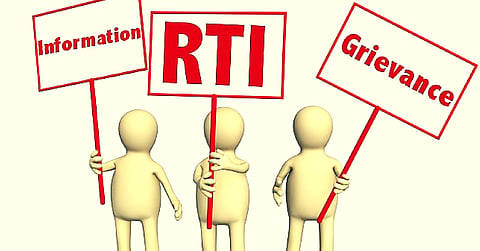
- Home
- Live Blog
- Breaking News
- Top Headlines
- Cities
- NE News
- Sentinel Media
- Sports
- Education
- Jobs

Can political parties be considered public authorities that come under the right to information (RTI) ambit? Yes, said the Central Information Commission (CIC) in 2013. No, chorused political parties in rare unison. And even as the Supreme Court continues to be seized of this question, a recent order by the Election Commission (EC) must be music to the ears of parties spread across the political spectrum. A Pune-based activist had asked for details of donations collected by 6 national parties BJP, Congress, BSP, NCP, CPI and CPI(M) as well as the Samajwadi Party through electoral bonds. After the chief public information officer of the EC refused to furnish details, the poll watchdog’s first appellate authority too took the same stand by stating that ‘political parties are out of the purview of RTI’, even as he raised the possibility of parties submitting information of donation collected through electoral bonds in their 2017-18 report expected by September 30 this year. The question naturally arises whether the EC can take such a stand when the apex court is yet to decide on the matter. The controversy erupted after RTI activists of the Association for Democratic Reforms (ADR) petitioned the CIC, asking that the sources of finance and contributions to six national parties be made public. A full bench of the CIC ruled on June 3, 2013 that the parties fulfilled the criteria of ‘public authorities’ and therefore must furnish the information sought under RTI Act. While none of the six parties challenged the CIC order in court, all parties were defiant and have steadfastly ignored RTI queries on funding. While the then UPA government called the CIC order “erroneous”, the Congress party took on the CIC, saying it was neither a court nor competent to exercise such jurisdiction.
After RTI activists moved the Supreme Court, the BJP-led NDA government in August 2015 submitted that bringing political parties under RTI Act “would hamper their smooth internal working”. Another petition filed in Supreme Court last October prayed that since political parties ‘enjoy great powers and indirect financing’, those refusing to share details under RTI should be de-registered. Other activists have questioned why parties still continue to enjoy concessions like land allotment at subsidised cost, and sundry facilities and exemptions. As all these issues continue to be publicly debated, it is instructive to note that funding of parties has in fact become more opaque after the issue of electoral bonds in the market. Touted as an instrument to clean up political funding by Finance Minister Arun Jaitley in his budget speech last year, electoral bonds were first put on sale by State Bank from March 1 to 10 this year. Interestingly, bonds worth Rs 222 crore were sold out in just those ten days, as revealed in the Lok Sabha. The government plans to put electoral bonds on sale four times a year, so the overall collection is likely to be impressive. It must be gratifying to the political class that in a country where investors are much sought after, there is no dearth of those wishing to invest good money in political parties! It is being speculated that as funding instruments, electoral bonds may soon overtake electoral trusts (which receive funds from corporate groups and distribute it among political parties through a route that can be traced; in year 2016-17, electoral trusts reportedly routed Rs 325 crore to parties).
While the scheme of selling electoral bonds promises to be a roaring success, it should be remembered that it guarantees complete anonymity to the donor. The bond will not contain the name of the donor; it will bear only the name of the party of his/her choice. But since the payment has to be made by cheque after filling of KYC norms — the donor’s identity can be easily known by the government. If the donor is a corporate entity, all it needs to do is to mention the amount donated in its balance sheet without specifying which party benefited from it. This apart, the amended Companies Act now allows a company to donate its entire profits to its political party of choice (the earlier 7.5 percent ceiling having been scrapped). On the other hand, political parties can cash the anonymous bonds through their registered bank accounts, and there will be no centralised information of all these transactions. Is it at all surprising that the EC has rejected an RTI query about the money political parties are getting through these bonds, when the whole scheme has been designed to be nameless to the public in the first place? Governments of various political hues have been systematically burying RTI, leaving information commissions headless for long, denying infrastructural support and tinkering with rules. Information officials of public authorities stonewall RTI queries with impunity or give replies which reveal little; meanwhile, pendency of RTI complaints in information commissions is rising to unsustainable levels. The EC’s response on political funding is just the latest nail driven in the coffin of the RTI Act.